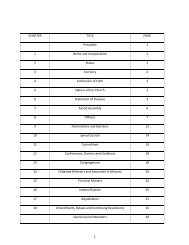Call Process Booklet
Call Process Booklet EDITED - Northwest Synod of Wisconsin
Call Process Booklet EDITED - Northwest Synod of Wisconsin
- No tags were found...
Create successful ePaper yourself
Turn your PDF publications into a flip-book with our unique Google optimized e-Paper software.
develop a rationale for this activity that was clearly communicated in the materials and<br />
procedures that the synod would use.<br />
Most people are quick to name the negatives that accompanied their experience of the<br />
call process. And I will too. But let it be said, first, that there are clear positives —<br />
congregations successfully undertake the difficult journey that begins in grief and ends<br />
in anticipation, rostered leaders are renewed as they discover new possibilities for their<br />
vision and energy, opportunities to help a ministry setting refocus its mission and<br />
redesign its ministry to find room to grow, and so, despite our frustrations with the<br />
process, God is honored, and the march of the church into the hurts and hearts of this<br />
world picks up its pace.<br />
Joy may come<br />
in the morning,<br />
but many feel<br />
that the call<br />
process<br />
causes us to<br />
linger too long<br />
in the night.<br />
This joy may come in the morning, but many feel that the call process causes us to<br />
linger too long in the night. In 2002, The Lutheran published the results of a very<br />
unscientific survey they had conducted, asking about the experience people had with<br />
the call process. Fully half of the 280 respondents found it to be frustrating; only 15<br />
percent found it to be wonderful. The negatives included the lack of consistency across<br />
the 65 call processes in use in the ELCA, the extended duration of many processes,<br />
the poor communication among the parties to the call process, the mandates for<br />
confidentiality, and the inability to locate an adequate pool of qualified candidates for<br />
consideration. Committees and rostered leaders alike had their horror stories to tell,<br />
and “the synod” was often the perpetrator.<br />
Growing Momentum<br />
The 2003 Churchwide Assembly in Milwaukee considered a memorial that originated in<br />
the Arkansas-Oklahoma Synod. The memorial cited the confusion and negative<br />
reactions associated with the call process and asked that a study be conducted<br />
resulting in recommendations that might improve the situation. The memorial<br />
specifically expressed a desire for a call process handbook, for information on best<br />
practices, and for information about legal implications. I attended that assembly but I<br />
don’t recall any discussion around this issue, perhaps because it was so obviously a<br />
no-brainer. The call process needed attention.<br />
In 2004, the ELCA Church Council called for a task force to work on this issue. Twenty<br />
leaders representing all segments of the ELCA gathered; Roy Oswald of the Alban<br />
Institute was the resource person. We were divided into work groups to concentrate on<br />
various parts of the problem. We listened, surveyed, mapped out ideas, and presented<br />
some recommendations to a 2006 meeting of the Conference of Bishops. The ideas<br />
that emerged in the task force meeting are now shaping the Mobility Database Project,<br />
begun in 2007, and scheduled for completion by December 2008.<br />
Page 128<br />
Walking together † for the sake of mission † in God’s world<br />
944 24 ¼ Street • PO Box 107 • Chetek, WI 54728 • 715-859-6810 • Fax 715-859-6812 • www.nwswi.org




